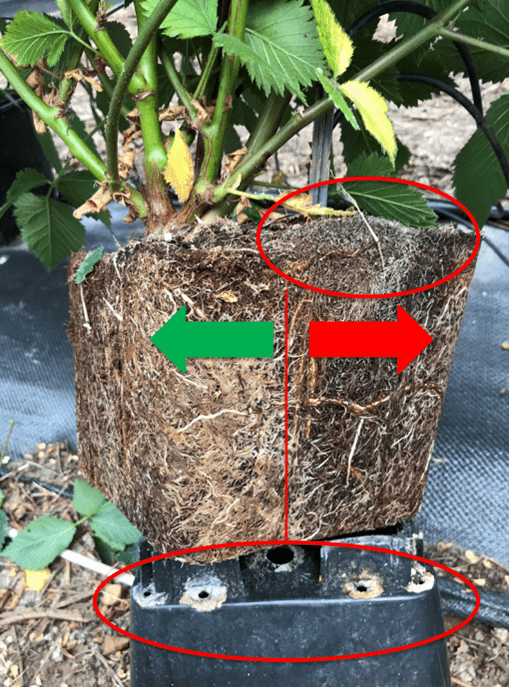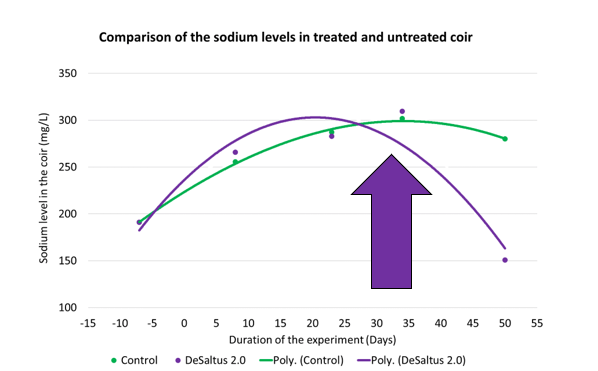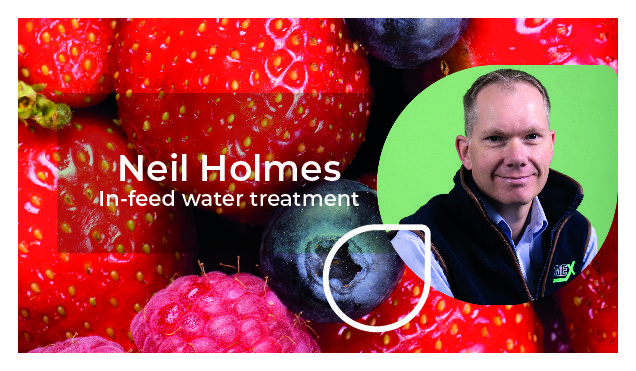In this article, soft fruit agronomist Neil Holmes, discusses in-season, in-feed water treatment utilising DeSaltus 2.0
Unwanted nutrients derived from the base water can quickly build up in substrate grown soft fruit crops. This leads to a salt crust around the pot, bag or surface of the coir, nutrient antagonism and “dead zones” in the substrate where roots do not grow (see figure 1 below). Flushing with calcium nitrate to alleviate these issues during the growing season can lead to problems of over wet coir, anaerobic conditions in the substrate, poor nutrient uptake and soft fruit.
 Figure 1 Salt accumulation around the pot’s drainage holes and surface of the coir leaving a white deposit in a substrate grown blackberry crop. An imbalance in the feed distribution has caused a grow zone (green arrow) and a dead zone (red arrow) for roots in the coir.
Four years of trials in soft fruit crops have consistently shown that using DeSaltus 2.0 at a concentration of 2.5L/ 1000L stock tank, reduced the levels of Na, chloride (Cl) and sulphates (S) in the substrate. Such a response was observed even when the Na concentration in the base water was 20 mg/L.
However, in 2022 with double the normal number of irrigation cycles applied during the record high UK temperatures in July and August, it was observed that twice the DeSaltus 2.0 inclusion rate was required (5.0L/1000L stock tank) to combat the build up of unwanted nutrients that originated in the base water (see figure 2 below).
Figure 1 Salt accumulation around the pot’s drainage holes and surface of the coir leaving a white deposit in a substrate grown blackberry crop. An imbalance in the feed distribution has caused a grow zone (green arrow) and a dead zone (red arrow) for roots in the coir.
Four years of trials in soft fruit crops have consistently shown that using DeSaltus 2.0 at a concentration of 2.5L/ 1000L stock tank, reduced the levels of Na, chloride (Cl) and sulphates (S) in the substrate. Such a response was observed even when the Na concentration in the base water was 20 mg/L.
However, in 2022 with double the normal number of irrigation cycles applied during the record high UK temperatures in July and August, it was observed that twice the DeSaltus 2.0 inclusion rate was required (5.0L/1000L stock tank) to combat the build up of unwanted nutrients that originated in the base water (see figure 2 below).
 Figure 2 Levels of sodium (Na) present within coir samples in untreated (green) and DeSaltus 2.0 treated (purple) pots of a long cane raspberry grown during June to August 2022. The large purple line illustrates the point during the experiment where the equivalent application rate of 5.0L of DeSaltus 2.0 per 1000L stock tank was added into the fertigation.
The drastic reduction in Na, Cl and S in the coir which accompanied the higher inclusion rate is supported by on-farm experiences where growers have reported using an inclusion rate of 6L DeSaltus 2.0/ 1000L stock tank to flush coir bags during a narrow time window.
Using DeSaltus 2.0 saves labour time and reduces the chances of getting soft fruit which can lead to a supermarket rejection following a calcium nitrate flush.
For more information, please contact your local OMEX technical manager, here.
Figure 2 Levels of sodium (Na) present within coir samples in untreated (green) and DeSaltus 2.0 treated (purple) pots of a long cane raspberry grown during June to August 2022. The large purple line illustrates the point during the experiment where the equivalent application rate of 5.0L of DeSaltus 2.0 per 1000L stock tank was added into the fertigation.
The drastic reduction in Na, Cl and S in the coir which accompanied the higher inclusion rate is supported by on-farm experiences where growers have reported using an inclusion rate of 6L DeSaltus 2.0/ 1000L stock tank to flush coir bags during a narrow time window.
Using DeSaltus 2.0 saves labour time and reduces the chances of getting soft fruit which can lead to a supermarket rejection following a calcium nitrate flush.
For more information, please contact your local OMEX technical manager, here.
 Figure 1 Salt accumulation around the pot’s drainage holes and surface of the coir leaving a white deposit in a substrate grown blackberry crop. An imbalance in the feed distribution has caused a grow zone (green arrow) and a dead zone (red arrow) for roots in the coir.
Four years of trials in soft fruit crops have consistently shown that using DeSaltus 2.0 at a concentration of 2.5L/ 1000L stock tank, reduced the levels of Na, chloride (Cl) and sulphates (S) in the substrate. Such a response was observed even when the Na concentration in the base water was 20 mg/L.
However, in 2022 with double the normal number of irrigation cycles applied during the record high UK temperatures in July and August, it was observed that twice the DeSaltus 2.0 inclusion rate was required (5.0L/1000L stock tank) to combat the build up of unwanted nutrients that originated in the base water (see figure 2 below).
Figure 1 Salt accumulation around the pot’s drainage holes and surface of the coir leaving a white deposit in a substrate grown blackberry crop. An imbalance in the feed distribution has caused a grow zone (green arrow) and a dead zone (red arrow) for roots in the coir.
Four years of trials in soft fruit crops have consistently shown that using DeSaltus 2.0 at a concentration of 2.5L/ 1000L stock tank, reduced the levels of Na, chloride (Cl) and sulphates (S) in the substrate. Such a response was observed even when the Na concentration in the base water was 20 mg/L.
However, in 2022 with double the normal number of irrigation cycles applied during the record high UK temperatures in July and August, it was observed that twice the DeSaltus 2.0 inclusion rate was required (5.0L/1000L stock tank) to combat the build up of unwanted nutrients that originated in the base water (see figure 2 below).
 Figure 2 Levels of sodium (Na) present within coir samples in untreated (green) and DeSaltus 2.0 treated (purple) pots of a long cane raspberry grown during June to August 2022. The large purple line illustrates the point during the experiment where the equivalent application rate of 5.0L of DeSaltus 2.0 per 1000L stock tank was added into the fertigation.
The drastic reduction in Na, Cl and S in the coir which accompanied the higher inclusion rate is supported by on-farm experiences where growers have reported using an inclusion rate of 6L DeSaltus 2.0/ 1000L stock tank to flush coir bags during a narrow time window.
Using DeSaltus 2.0 saves labour time and reduces the chances of getting soft fruit which can lead to a supermarket rejection following a calcium nitrate flush.
For more information, please contact your local OMEX technical manager, here.
Figure 2 Levels of sodium (Na) present within coir samples in untreated (green) and DeSaltus 2.0 treated (purple) pots of a long cane raspberry grown during June to August 2022. The large purple line illustrates the point during the experiment where the equivalent application rate of 5.0L of DeSaltus 2.0 per 1000L stock tank was added into the fertigation.
The drastic reduction in Na, Cl and S in the coir which accompanied the higher inclusion rate is supported by on-farm experiences where growers have reported using an inclusion rate of 6L DeSaltus 2.0/ 1000L stock tank to flush coir bags during a narrow time window.
Using DeSaltus 2.0 saves labour time and reduces the chances of getting soft fruit which can lead to a supermarket rejection following a calcium nitrate flush.
For more information, please contact your local OMEX technical manager, here. 